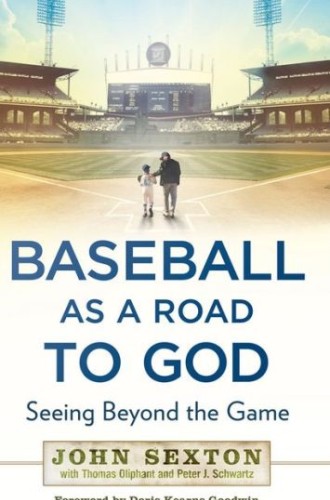Legends of the game
Somewhere between the loud arrival of John Madden and the coronation of Michael Jordan and Dale Earnhardt, baseball ceased to be the American pastime. If you measure a sport’s influence by the revenue it produces or the number of TV viewers it attracts, baseball falls to second or third place, well behind NFL football and buried when college and professional football are considered together. A recent Harris poll confirms baseball’s downward trend, which in long-term consistency resembles that of the mainline church.
The exact date of baseball’s demotion is as hard to pinpoint as the birth of postmodernism or the death of American innocence. But tune into the MLB Network for a late game between the Mariners and the Astros in a near-empty stadium in which the few remaining fans are snacking on sushi rather than hot dogs, and you know something bad has happened.
Read our latest issue or browse back issues.
How to explain, then, the continuous flow of elegiac tributes to baseball that appear every summer? Are the authors self-deceived when it comes to baseball’s flaws, perhaps writing more about themselves and their own childhood experience of the game than about the game itself? After all, there is nothing like the memory of holding your father’s hand as he walks with you up the winding ramp of Sportsman’s Park in St. Louis, Wrigley Field in Chicago or Forbes Field in Pittsburgh and of emerging from the shadows to your first view of the field—green, brilliant in the afternoon sun and ready for play.
John Sexton’s Baseball as a Road to God joins company with the works of some impressive lovers of the game, such as Roger Kahn, John Updike, Bernard Malamud, Bart Giamatti, W. P. Kinsella and Doris Kearns Goodwin, each of whom discerns in a unique way a hidden wholeness in baseball that is not present in other sports. They echo the prophetic intuition of Walt Whitman, who in 1846 took note of “a certain game of ball” in the fields of Brooklyn (and whose words are quoted by Sexton): “I see great things in baseball. It is our game, the American game. Baseball will . . . tend to relieve us from being a nervous, dyspeptic set, repair those losses and be a blessing to us.”
No other sport is so rooted in its own history and tradition; no other sport negotiates the distinction between the immutable laws of the game (three strikes and you are always out) and the infinitude of time and space in which those laws operate. Theoretically a baseball game may go on forever; the yellow foul poles on either end of the field are nothing more than visible signs of an invisible, infinite extension. When Roy Hobbs hits the climactic home run in the film version of The Natural, the viewer does not expect to see the ball come down in our time and space.
Not many authors write about professional football and basketball in poetic, moral or religious terms because these sports do not tell us who we are in quite the way baseball does. The human being is not by nature a bone-crushing hunter or a swaggering show-off. We have our allotted innings and play them out as best we can, but always within the friendly confines of eternity. We are the only creatures who hew to the immutable laws of birth and death even as we dream of their transformation.
Football and basketball appear determined to delete a memory in all of us that refuses to be deleted: even though we pursue highly mobile, digitized, climate-controlled lives, we remember a time when we lived closer to the land, when the weather and the condition of the soil mattered, when we were not ruled by the clock. And even though we despise how baseball is now being played—with designated hitters, steroids, skintight uniforms, instant replays, pitchers who can’t finish games, .260 hitters who earn $10 million a year—we are still capable, barely, of discerning the essence of a glorious game in, with and under its material deformations.
Sexton is president of New York University, where for more than a decade he has taught a seminar on baseball as a road to God. As the title indicates, he is one of those who love the game of baseball but want more from it, perhaps more than baseball has to give. Although he describes his experience of the game in terms of the numinous and “ineffable,” his book really is about baseball and only secondarily about religion. It is filled with the stories we have come to love: the tragedy of Shoeless Joe Jackson; the malignity of Ty Cobb; the saintliness of Christy Mathewson, Lou Gehrig and Roberto Clemente; the Curse of the Bambino; the Red Sox’s return from the dead in 2004—all of them framed by the author’s childhood devotion to the Brooklyn Dodgers and the soap opera of his conversion from “da Bums” to the Yankees.
These well-told stories are supplemented by what the uninitiated will be tempted to call trivia. For example, Sexton devotes an entire chapter to the origins of the seventh-inning stretch and relates fond memories of the spitball when it was legal. Each chapter has a religious theme. In the chapter on miracles, Sexton retells stories like those of Bobby Thompson’s National League pennant–winning home run in 1951 and Willie Mays’s catch in the 1954 World Series, then cuts to Jesus’ words on faith in the Gospel of John, echoed by Tug McGraw: “You gotta believe.”
Sexton’s natural theology of baseball tends to rely on theologians and philosophers of religion such as William James, Mircea Eliade, Rudolf Otto, Karen Armstrong and Paul Tillich. Theology’s own Murderers’ Row—Barth, Bonhoeffer, Cone and Gutiérrez—do not come to the plate. Sexton describes his book as nothing more than “a vehicle to tell some stories that reveal a love of baseball—and (in some of the stories) display the joy of a spiritual life.”
Readers may grow queasy, however, when he asks whether baseball, like Catholicism or Islam, can be a road to God for some. Where he loses me is in his breezy association of baseball with things that really matter, like faith, hope, doubt, suffering, conversion and community. This is not a book to get stuffy or huffy about, but the comparison of Jews who observe Passover every year with Pirates fans who gather annually to remember Bill Mazeroski’s miraculous home run does not pass my commensurability test. Nor does the author’s comparison of his own wrenching conversion (to the Yankees) with the conversions of Paul, Augustine and C. S. Lewis. There will be readers who, like me, love the baseball stuff in this book but would enjoy it as much or maybe more without the religious overlay.
The question remains: Is baseball a road to God? Well, no, not exactly. At least no more than hiking the Appalachians, volunteering in a hospice, reading Emily Dickinson, listening to John Coltrane, making a friend or raising a child. These are paths that carry us away from ourselves and toward the awareness of a greater love. But does baseball stir memories in some of us of better times shared with those we love? Does it suggest a goodness in ordinary life that is waiting to be found and celebrated? This book is eloquent testimony in the affirmative. Sexton’s wonderful stories witness not only to his love of baseball but to the enduring qualities of the game itself—God’s game, if you will. In a culture in which sport is often a metaphor for the speed and violence of daily life, baseball offers another way. The author says it best: “Baseball calls us to live slow and notice.” This man’s heart is in the right place.






